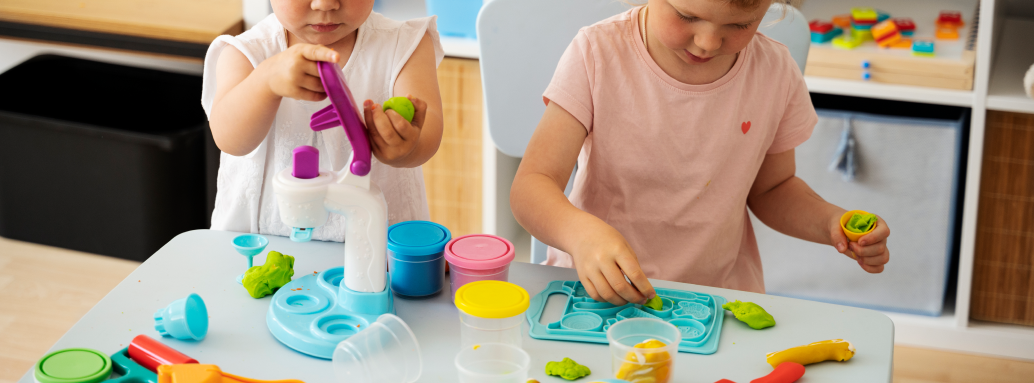In the world of early childhood education and development, the power of sensory play cannot be underestimated. It's not just about getting messy with finger paints or squishing playdough between little fingers; sensory play is a vital component of a child's growth and development. In this article, we will delve into the fascinating world of sensory play and explore the myriad benefits it offers to our youngest learners.
Introduction to Sensory Play in Early Childhood
Have you ever wondered why children are so drawn to playing with different textures, sounds, and colors? This fascination is more than just play – it's an essential part of their development. Sensory play, an activity that stimulates a child's senses, is crucial for their growing brains. It's not just fun; it's a fundamental part of learning in the early years.
Understanding Sensory Play and Its Importance
What Is Sensory Play?
Before we dive into the benefits, let's understand what sensory play is all about. Sensory play involves activities that stimulate one or more of the five senses: touch, sight, smell, taste, and hearing. These activities can be as simple as playing with sand, water, or exploring different textures and materials. Sensory play is not only enjoyable but also a valuable tool for enhancing a child's cognitive, physical, and emotional development.
Sensory play includes any activity that engages a child's senses of touch, smell, taste, sight, and hearing, as well as anything which engages movement and balance. From playing in a sandbox to squishing playdough, these experiences are more than just entertaining.
Why Is Sensory Play Important for Children?
Sensory experiences offer rich opportunities for learning. Through sensory play, young children develop language skills, fine and gross motor skills, social skills, and self-control. It's also a fantastic way to encourage creative thinking and problem-solving.
Boosts Cognitive Development
-
Enhanced Brain Development: Sensory play provides children with opportunities to explore and learn about the world around them. When they engage with various textures, colors, and sounds, their brains are hard at work making connections and forming neural pathways. This boosts their cognitive development, leading to improved problem-solving skills and creativity.
-
Language Skills: Sensory play often involves conversations and discussions about what children are experiencing. This verbal interaction enhances their language skills as they describe the sensations they are feeling, leading to an expanded vocabulary and improved communication skills.
-
Math and Science Skills: Sorting, measuring, and experimenting with different materials during sensory play can lay the foundation for math and science concepts. For example, pouring and transferring water from one container to another helps children grasp concepts like volume and capacity.
Promotes Physical Development
-
Fine Motor Skills: Activities like picking up small objects, squeezing playdough, or threading beads help young children develop their fine motor skills. These activities require precision and control of the small muscles in the hands and fingers, which are essential for tasks like writing and buttoning shirts.
-
Gross Motor Skills: Some sensory play activities, such as jumping in a ball pit or running fingers through sand, involve gross motor skills. These movements strengthen large muscle groups, improve balance, and coordination.
Supports Emotional and Social Development
-
Self-Regulation: Sensory play can be a calming and soothing experience for children. It provides a safe space for them to explore their emotions and learn self-regulation. For example, playing with kinetic sand can be a relaxing activity that helps children manage stress or anxiety.
-
Social Skills: Sensory play often occurs in group settings, such as daycare centers or preschools. This provides children with opportunities to interact with their peers, share materials, and engage in cooperative play. These social interactions are crucial for developing essential social skills like sharing, taking turns, and empathy.
Enhances Sensory Awareness
-
Heightened Senses: Engaging in sensory play helps children become more aware of their senses. They become more attuned to subtle differences in textures, temperatures, and sensory experiences. This heightened sensory awareness can benefit them in everyday life, such as being more discerning about food preferences or clothing comfort.
-
Sensory Integration: For some children, particularly those with sensory processing challenges, sensory play can be a therapeutic tool. It helps them integrate and process sensory information more effectively, reducing sensitivities and improving their ability to function in various environments.
Key Benefits of Sensory Play
1. Cognitive Growth
Sensory play helps to build nerve connections in the brain's pathways. This leads to a child's ability to complete more complex learning tasks and supports cognitive growth, language development, and fine motor skills.
2. Enhancing Memory
Engaging the senses can help children improve their memory and recall by creating more vivid memories and associations.
3. Developing Fine and Gross Motor Skills
Activities like stacking blocks, pouring water, or molding clay help improve fine motor skills, while larger activities like climbing or jumping in leaves encourage gross motor development.
4. Promoting Social Interaction
Sensory play can also be a social activity, teaching children about cooperation, negotiation, and sharing.
5. Emotional and Sensory Development
For children with sensory processing challenges, sensory play is particularly beneficial. It helps them learn to process information from their senses and can be calming for children who are easily overwhelmed.
Practical Sensory Play Ideas
1. At Home Sensory Activities
Simple activities like cooking, gardening, and playing with water can be effective forms of sensory play. These activities are easy to set up and can be incredibly engaging.
2. Sensory Play in Nature
Encourage children to explore the outdoors. Activities like walking barefoot in the grass or playing with leaves can be a great way to stimulate the senses.
3. Incorporating Sensory Play in Daily Routine
You can easily integrate sensory play into daily routines. For example, have your child help with baking to experience the textures and smells, or create a small garden for them to tend to.
Tips for Parents and Educators
1. Ensuring Safety in Sensory Play
While sensory play is beneficial, it's crucial to supervise young children to ensure they are safe, especially when they are exploring objects that could be a choking hazard or are toxic if ingested.
2. Adapting Sensory Play for Different Ages
Tailor sensory play activities to suit the age and developmental stage of the child. For toddlers, simpler activities like playing with food-safe materials are ideal.
3. Encouraging Imagination, Exploration, and Creativity
Let children lead their sensory play. It’s important they feel free to explore and express their creativity without too many rules or expectations.
Sensory play is inherently open-ended and unstructured, allowing children to use their imaginations freely. Whether they are building imaginary worlds in a sandbox or creating culinary masterpieces in a mud kitchen, sensory play fosters creativity and innovation. This unstructured playtime is a stark contrast to today's highly structured academic environments, making it even more valuable for young learners.
Conclusion
Sensory play is a powerhouse of benefits for young children. It nurtures their cognitive, physical, emotional, and social development while promoting sensory awareness and encouraging creativity. As educators and parents, we should actively incorporate sensory play into children's daily routines, recognizing its pivotal role in their growth and learning journey.
Sensory play is an indispensable part of early childhood development. It provides a foundation for learning in a fun, engaging, and developmentally appropriate way. By incorporating sensory experiences into everyday activities, we can support the holistic development of young children.
FAQs
-
What Are Some Simple Sensory Play Activities for Toddlers? Discover easy and safe sensory play ideas suitable for toddlers, focusing on their developmental needs and safety.
-
How Does Sensory Play Benefit Children with Special Needs? Learn about the specific advantages of sensory play for children with special needs, including those with sensory processing disorders.
-
Can Sensory Play Help with Language Development? Explore the connection between sensory play and language development in young children, and how it enhances communication skills.
-
What Materials Are Best for Sensory Play at Home? Find out about safe, easily accessible materials that you can use for sensory play activities in the home environment.
-
How Can Educators Incorporate Sensory Play in the Classroom? Get insights on integrating sensory play into educational settings, including ideas and strategies for teachers and educators.
Billing, Invoicing Automation & Smart Finances
Communication & Engagement
Child Development & Progress
Waitlist, Forms & Attendance
Effortless Team Management
Daily Updates That Matter
Templates & Printables
Blogs
Webinars
Case Studies & Testimonials
FAQs
Help Center



